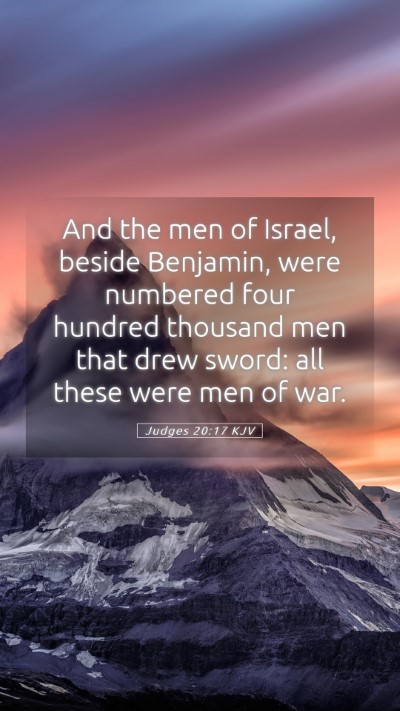Bible Verse Commentary on Judges 20:17
The verse Judges 20:17 states: "And the men of Israel, beside Benjamin, were numbered four hundred thousand men that drew sword: all these were men of war." This verse is situated within a critical chapter in the Book of Judges, which addresses the civil war among the tribes of Israel. Below is a comprehensive interpretation and explanation of this verse, combining insights from several public domain commentaries.
Contextual Background
Judges 20 describes a significant moment in Israel's history where the tribes come together to address the moral decay and iniquity that had surfaced, particularly focusing on the tribe of Benjamin. This context is crucial for understanding the meaning of the verse.
Verse Meaning and Insights
-
Matthew Henry's Commentary:
Henry emphasizes the unity of Israel against Benjamin, shedding light on the seriousness of the situation where the other tribes felt compelled to act against their fellow Israelite tribe. The mention of "four hundred thousand" reveals the large military capacity of Israel and possibly signifies the gravity of the conflict at hand, indicating that this was a matter of life and death for the tribes involved.
-
Albert Barnes' Notes:
Barnes touches on the idea of preparation for warfare among the Israelites, reflecting on their readiness to confront evil within their community. The precise count of men signifies not only their military strength but the collective resolve of the tribes to maintain justice and righteousness within Israel, showcasing their commitment to upholding their covenant with God even at a cost.
-
Adam Clarke's Commentary:
Clarke provides a detailed analysis of the numbers, indicating that the verse highlights the importance of order and discipline in ancient Israelite warfare. He notes that the need to gather such a massive force underlines the bleakness of the moral situation, as well as the tribe of Benjamin’s stubbornness and willingness to protect their own against the judgments of the other tribes.
Spiritual and Theological Implications
This verse does not merely serve as a census of men prepared for battle; it also conveys deeper spiritual implications regarding unity, accountability, and the seriousness of sin.
-
Unity in Conflict:
The mobilization of the tribes of Israel against Benjamin implies that maintaining purity and righteousness requires decisive action, even if it leads to conflict among brethren.
-
The Weight of Accountability:
The number of soldiers indicates a united front against the moral corruption that had taken root, emphasizing that each tribe had a role in accountability, reflecting on the communal aspect of sin.
-
Consequences of Sin:
This event illustrates how sin can impact the wider community and necessitate difficult decisions that can lead to internal strife.
Application of the Verse
When considering the application of Judges 20:17 in today's context, believers are reminded of the importance of communal accountability and the significance of standing against sin. The unity amongst the tribes suggests that when facing evil, the church and community must come together in a stance of righteousness, even when it may lead to difficult confrontations.
Cross References
- Deuteronomy 13:12-15: Addresses the punishment of sin within a community.
- 1 Corinthians 5:6-7: Relates to the necessity of keeping a pure church.
- Galatians 6:1: Discusses restoring those who have fallen into sin, emphasizing accountability.
Conclusion
Judges 20:17 is a powerful reminder of the responsibilities that come with community and the actions needed to uphold justice and righteousness through collective effort. The biblical exegesis of this verse enlightens readers about the historical context and the spiritual lessons that can be drawn for contemporary understanding and application.
Related Study Resources
For those looking to delve deeper into this scripture and its implications, consider the following:
- Participating in bible study groups focused on the Book of Judges.
- Exploring online Bible study tools for historical context analysis.
- Utilizing bible study guides specifically addressing difficult Old Testament passages.


